| TECHNICAL DATA |
|---|
| Country of Origin | USA |
|---|
| Date Of Introduction | 1926 |
|---|
| Caliber | 0.45 in (11.43 mm) |
|---|
| Cartridge | .45 ACP - Automatic Colt Pistol |
|---|
| System of Operation | Short recoil, semi-automatic |
|---|
| Weight With Empty Magazine | 2.4 lb (1.1 kg) |
|---|
| Weight With Full Magazine | 3 lb (1.4 kg) |
|---|
| Length | 8.625 in (219 mm) |
|---|
| Barrel Length | 5.03 in (128 mm) |
|---|
| Barrel Rifling | L.H., six grooves, pitch 1 in 16 inches (406 mm) |
|---|
| Safety Features | Manual safety lever, grip safety, half-cock position |
|---|
| Trigger Pull | 5 to 6.5 lb (2.3 to 2.9 kg) |
|---|
| Magazine Capacity | 7 rounds |
|---|
| Basic Load | 21 rounds |
|---|
| Unit Replacement Cost | $242 |
|---|
| Performance |
|---|
| Muzzle Velocity | 830 fps (253 mps) |
|---|
| Muzzle Energy | 358 foot-pounds (485 J) |
|---|
| Maximum Range | 1,640 yd (1,500 m) |
|---|
| Maximum Effective Range | 55 yd (50 m) |
|---|
| Sights |
|---|
| Front Sight | Blade, integral with slide |
|---|
| Rear Sight | Notched bar, dovetailed to slide |
|---|
| Sight Radius | 6.481 in (165 mm) |
|---|
DESCRIPTION
The M1911A1 .45 caliber pistol is a magazine-fed, semi-automatic, recoil-operated, single-action hand gun. It uses a .45 caliber
rimless cartridge in a seven-round magazine. It fires one round each time the trigger is squeezed, once the hammer is cocked by prior
action of the slide or thumb. This design is referred to as "single-action." The thumb safety may only be activated once
the pistol is cocked.
HISTORY
John M. Browning designed the M1911 in response to the Army's need for a pistol with greater stopping-power following the Army's
experience with close-in combat during the Philippine Insurrection (1899-1901). The M1911A1 model recoil semi-automatic adopted in
1926, was the standard personal defense weapon carried by officers and team leaders of all services during World War I, World War II,
and Korea. Production was ended in 1945.
The M1911 has a rich military heritage, was very reliable, and the weapon of choice for use in close quarters. It was used up until
1984, when it began to be replaced by the more modern M9 9mm pistol.
OPERATION
Each time a cartridge is fired, the parts inside the weapon function in a given order. This is known as the functioning cycle or
cycle of operation. The cycle of operation of the M1911A1 is divided into eight steps: feeding, chambering, locking, firing, unlocking,
extracting, ejecting, and cocking. The steps are listed in the order in which functioning occurs; however, more than one step may occur
at the same time.
- A magazine containing ammunition is placed in the receiver. The slide is pulled fully to the rear and released.
As the slide moves forward, it strips the top round from the magazine and pushes it into the chamber. The hammer remains in
the cocked position, and the weapon is ready to fire.
- The weapon fires one round each time the trigger is pulled. Each time a cartridge is fired, the slide and barrel recoil or
move a short distance locked together. This permits the bullet and expanding powder gases to escape from the muzzle before the
unlocking is completed.
- The barrel then unlocks from the slide and continues to the rear, extracting the cartridge case from the chamber and
ejecting it from the weapon. During this rearward movement the magazine feeds another cartridge, the recoil spring is compressed,
and the hammer is cocked.
- At the end of the rearward movement, the recoil spring expands, forcing the slide forward, locking the barrel and slide
together. The weapon is ready to fire again. The same cycle of operation continues until the ammunition is expended.
- As the last round is fired, the magazine spring exerts upward pressure on the magazine follower. The stop on the follower
strikes the slide stop, forcing it into the recess on the bottom of the slide and locking the slide to the rear. This action
indicates that the magazine is empty and aids in faster reloading.
AMMUNITION
Ammunition for the M1911A1 is issued in the form of a complete .45 ACP round. A complete round (cartridge) consists of all the components
(cartridge case, bullet, propellant powder, and primer) necessary to fire the weapon once.
Click here for more information.
- .45 M1911 Ball
- .45 M9 Blank
- .45 M1921 Dummy
- .45 M26 Tracer
- .45 XM261 High Density Shot
More M1911A1 Art
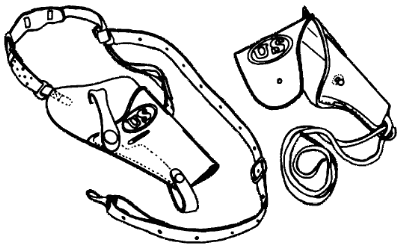
M7 shoulder holster, M1916 hip holster
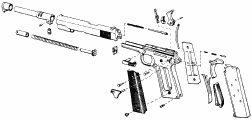
M1911A1 partial exploded view.
Click on image to see full size: 900x425, 33K, GIF
M1911A1 Photos - Click on image sample to see full size image.
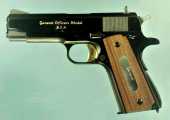
General Officers Model
U.S. Army Photo
566x400, 27K, JPEG
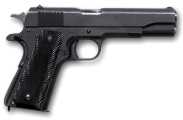
M1911A1
U.S. Air Force Photo
2100x1387, 480K, JPEG
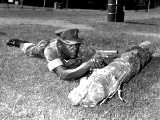
M1911A1
Marine Sgt. M. W. Patrick, military policeman, police protective course
U.S. DoD Photo by Gene Jones
06-APR-1981
1024x768, 248K, JPEG, B/W
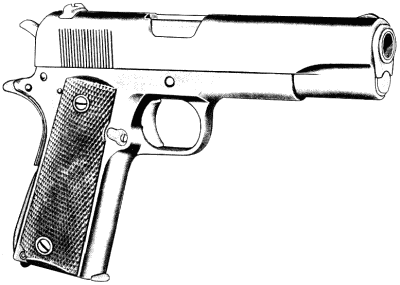

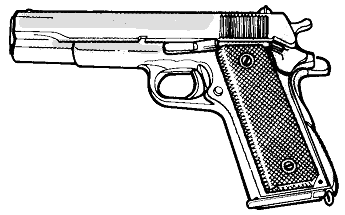
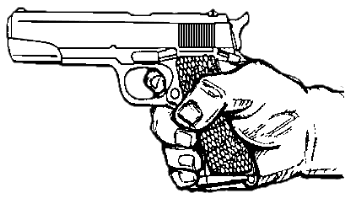
 M7 shoulder holster, M1916 hip holster
M7 shoulder holster, M1916 hip holster